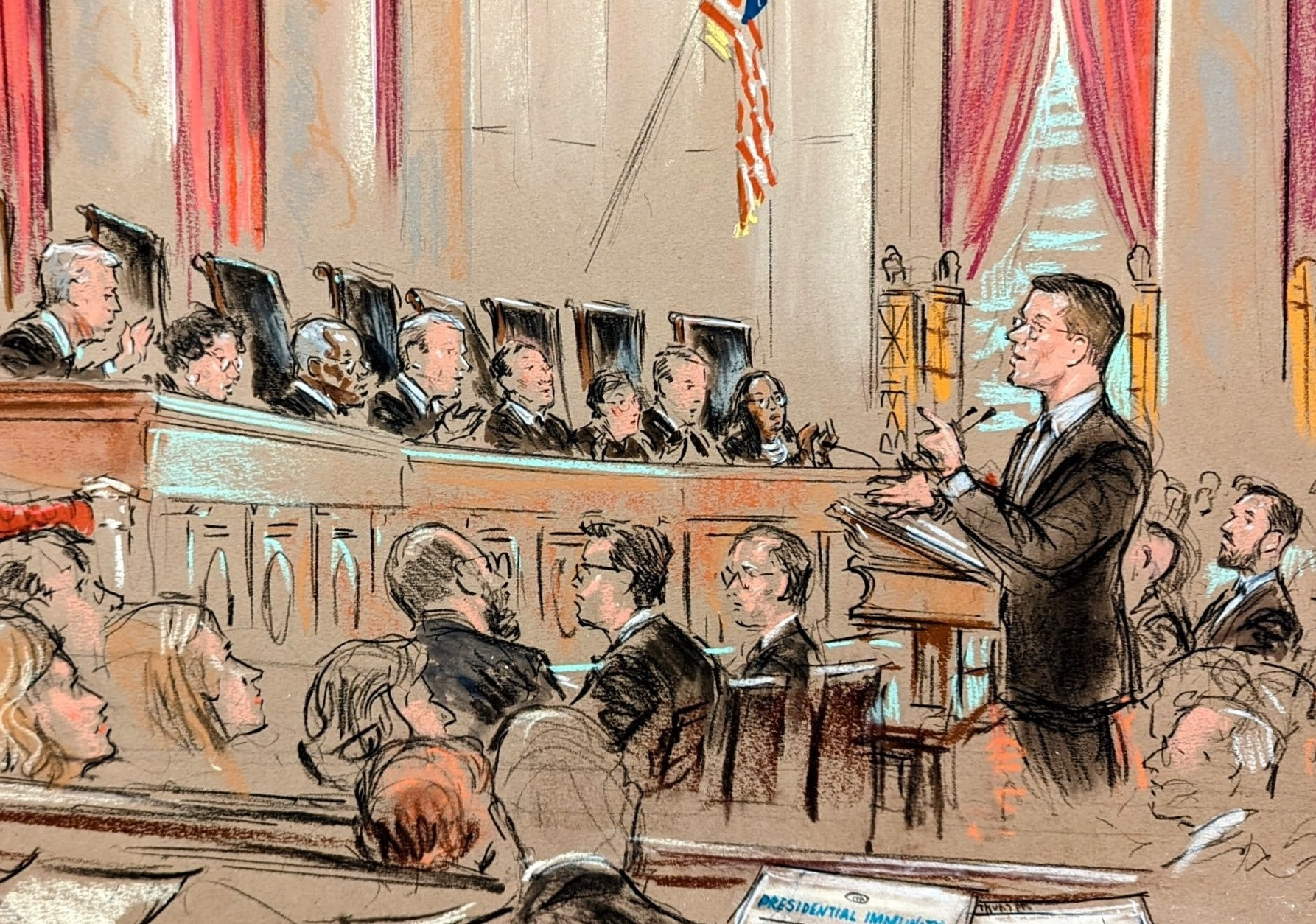President Donald Trump has announced his intention to nominate D. John Sauer, a distinguished legal figure who recently championed Trump’s legal arguments before the Supreme Court, as the next Solicitor General of the United States. This significant nomination spotlights Sauer’s robust conservative credentials and his history of advocating for high-profile, often contentious, legal positions.
 D. John Sauer arguing in front of the Supreme Court justices, highlighting his legal expertise and experience in constitutional law.
D. John Sauer arguing in front of the Supreme Court justices, highlighting his legal expertise and experience in constitutional law.
Trump lauded Sauer in a public statement as an “exceptionally accomplished and masterful appellate attorney,” signaling the administration’s confidence in his legal acumen and strategic capabilities. At 50 years old, Dean John Sauer brings to the table a wealth of experience and an impressive academic background, mirroring the profiles of past Solicitors General. His nomination is poised to be a focal point of legal and political discussion, given his prior advocacy and the critical role of the Solicitor General in shaping the U.S. government’s legal strategy.
Dean John Sauer’s qualifications are undeniably strong. As a Rhodes Scholar and a Harvard Law School alumnus, his academic foundation is impeccable. He further honed his legal expertise through clerkships with Judge J. Michael Luttig of the U.S. Court of Appeals for the 4th Circuit – a respected conservative voice who has become critical of Trump – and later with the iconic Justice Antonin Scalia. His career also includes a five-year stint as a federal prosecutor, providing him with invaluable courtroom experience from the government’s perspective.
Before his foray into private practice, Dean John Sauer served for six years as the Solicitor General of Missouri, a position that allowed him to champion conservative legal viewpoints on a state level. This role provided him with a platform to engage in significant legal battles and make his mark on the national legal stage.
His tenure as Missouri’s Solicitor General saw him make his debut appearance before the Supreme Court in Bucklew v. Precythe. In this landmark case, Dean John Sauer successfully defended Missouri’s lethal injection protocol against an Eighth Amendment challenge. The case revolved around an inmate who argued that the method of execution would inflict cruel and unusual punishment due to a medical condition that could cause him to choke on his own blood. Sauer’s victory in this case underscored his capability to argue complex constitutional matters effectively before the highest court.
Further demonstrating his commitment to conservative legal principles, Dean John Sauer played a key role in the aftermath of the 2020 presidential election. In December 2020, he spearheaded a coalition of states in an amicus brief supporting Texas’s contentious lawsuit seeking to overturn election results in key battleground states won by Joe Biden. Although the Supreme Court ultimately dismissed the case due to lack of standing, Sauer’s brief argued that Texas’s claims “raise important questions about election integrity and public confidence.” This action highlights his willingness to engage in politically charged legal disputes and his alignment with conservative concerns regarding election administration.
Moreover, in 2022, Dean John Sauer challenged the Biden administration’s COVID vaccine mandate for healthcare workers in federally funded facilities, representing Missouri and nine other states. While the Supreme Court declined to review his petition, this case further exemplifies his active role in challenging federal policies and advocating for states’ rights and individual liberties from a conservative standpoint.
Following his impactful tenure as Missouri Solicitor General, Dean John Sauer established his own law firm, the James Otis Law Group. The firm’s name is a nod to James Otis, an 18th-century Massachusetts lawyer and legislator celebrated for his early advocacy against British colonial policies. Otis is often linked to the phrase “Taxation without representation is tyranny,” though historical accounts suggest this attribution might be an oversimplification. This choice of name reflects Sauer’s interest in historical legal figures who championed individual rights and challenged governmental overreach.
In private practice, Dean John Sauer has continued to be involved in prominent and often controversial cases. He represented Louisiana, alongside Missouri, in their unsuccessful attempt to limit the federal government’s communications with social media companies regarding content moderation in Murthy v. Missouri. Currently, he is representing state officials defending an Arizona law that prohibits transgender women and girls from participating in women’s sports at the college and school levels. These cases illustrate his ongoing engagement in contemporary legal battles concerning free speech, states’ rights, and social issues.
However, it was Dean John Sauer’s representation of Donald Trump in the landmark immunity case, Trump v. United States, that likely solidified his position for the Solicitor General nomination. After Trump’s loss in the D.C. Circuit Court of Appeals, Sauer took the case to the Supreme Court. In a significant 6-3 ruling, the Supreme Court sided with Trump’s argument for broad presidential immunity from criminal prosecution for official acts, sending the election interference charges back to a lower court for review. This victory was crucial for Trump and undoubtedly elevated Dean John Sauer’s standing within Trump’s legal and political circles. With Trump’s electoral victory, the prosecution led by Special Counsel Jack Smith is expected to be wound down, further highlighting the significance of Sauer’s legal win.
Trump’s nomination of Dean John Sauer as Solicitor General coincides with his intention to nominate Todd Blanche as Deputy Attorney General. Blanche, who defended Trump in his New York state criminal trial, is slated for the second-highest position in the Department of Justice. These nominations signal a clear direction for the Justice Department under a new Trump administration, prioritizing figures with strong ties to the former president and a demonstrated willingness to advocate for his legal and political positions.
This article is adapted from coverage originally published by Amy Howe on Howe on the Court.

